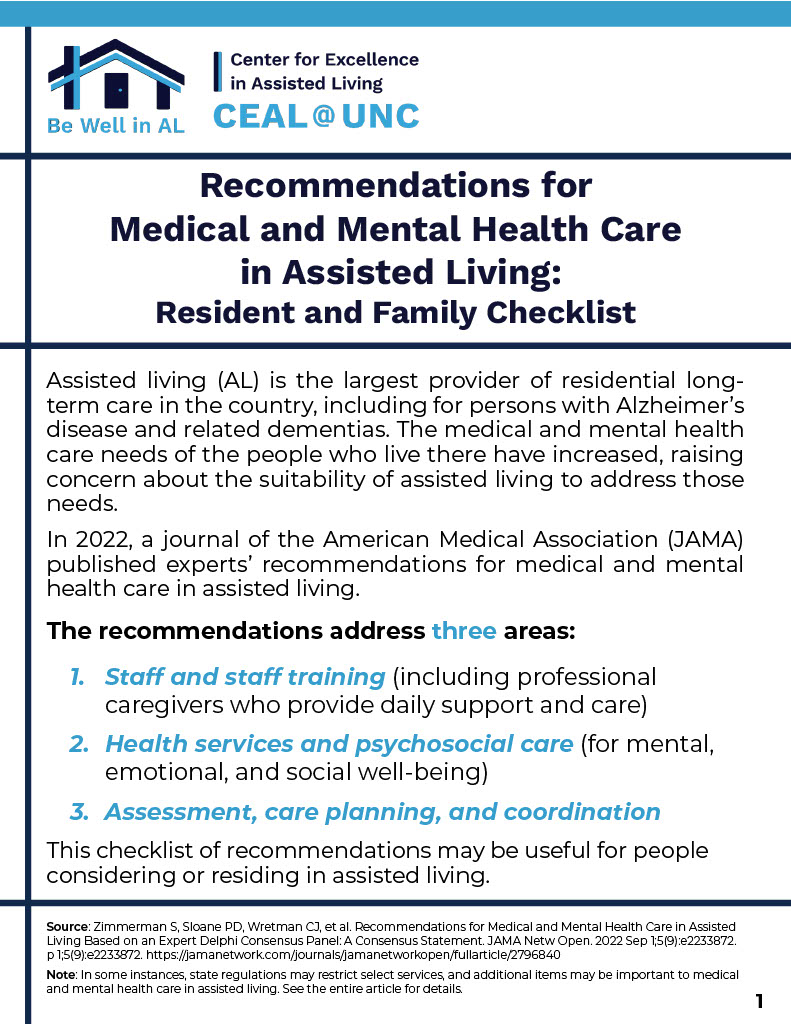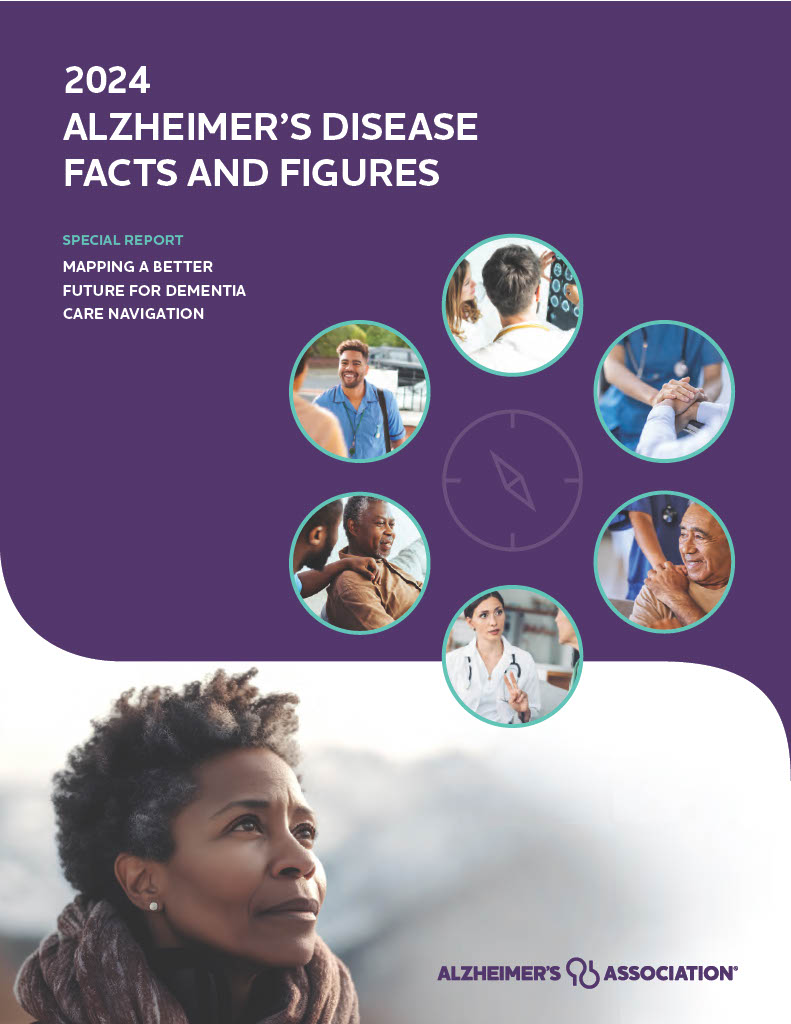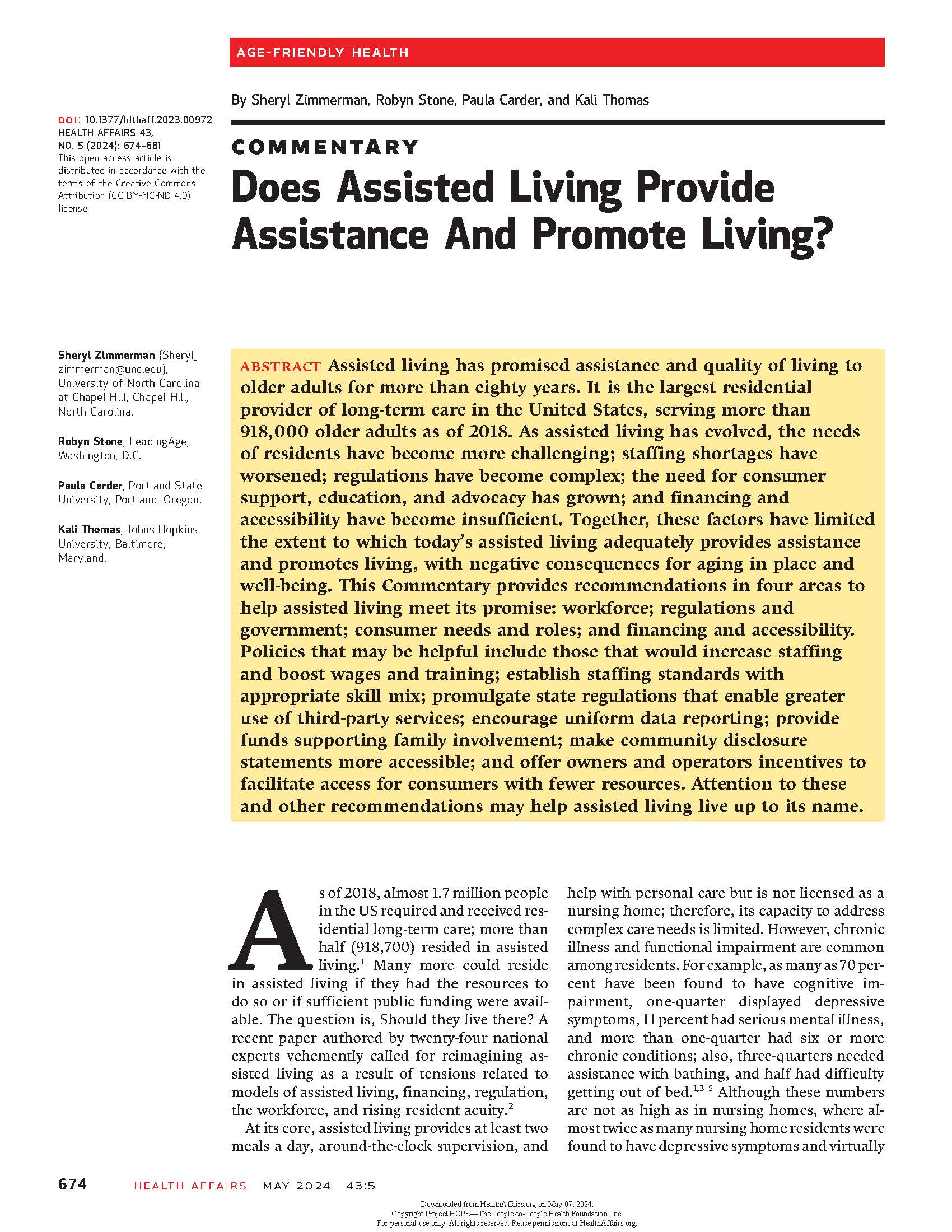Objectives The purpose of this study is to test the efficacy of a mobile-based multidomain application, Silvia Program, on cognitive functioning of residents in assisted living facilities (ALFs). Study design Pilot randomized controlled trial using a two-group pretest-posttest design. Methods Twenty participants living in ALFs were randomized to a Silvia group or usual care group. Silvia group received mobile-based […]
Cognitive/Dementia
Examining Engagement Calendar Deviations in Assisted Living: A Focus on Residents With Dementia
Examining Engagement Calendar Deviations in Assisted Living: A Focus on Residents With Dementia
Early in our longitudinal qualitative study on meaningful engagement and quality of life among assisted living (AL) residents with dementia, researchers observed differences between the activities scheduled on monthly engagement calendars and those taking place. Yet, we were unable to identify any research examining such deviations or their implications. Thus, drawing on data from three […]
Staffing Patterns in Nursing Homes, Assisted Living Communities, and Memory Care Units: Variation Across Shifts
Staffing Patterns in Nursing Homes, Assisted Living Communities, and Memory Care Units: Variation Across Shifts
Objectives To assess the staffing patterns of direct care nursing staff by shift in nursing homes (NHs), assisted living communities (ALCs), and their corresponding memory care units (MCUs). Design Observational study of the 2021 Ohio Biennial Survey of Long-Term Care Facilities and the Payroll-Based Journal data for December 2021. Setting and Participants NHs (n = 678) and […]
The Relationship between Perceived Engagement in Meaningful Activity and Behavioral and Psychological Symptoms of Dementia among Assisted Living Residents
The Relationship between Perceived Engagement in Meaningful Activity and Behavioral and Psychological Symptoms of Dementia among Assisted Living Residents
The purpose of this study is to assess the relationship between engagement in meaningful activities and behavioral and psychological symptoms of dementia (BPSD), including agitation, apathy, irritability, and depression among 71 assisted living (AL) residents with moderate to severe dementia. This secondary analysis used baseline data from a randomized controlled trial, Meaningful Activity for Managing […]
Clinical and Sociodemographic Characteristics of New Residents of Assisted Living: A Nested Case-Control Study
Clinical and Sociodemographic Characteristics of New Residents of Assisted Living: A Nested Case-Control Study
Objective To examine transitions to an assisted living facility among community-dwelling older adults who received publicly funded home care services. Design Nested case-control study. Setting and Participants Linked, population-level health system administrative data were obtained from adults aged 65 years and older who received home care services in Ontario, Canada, from April 1, 2018, to December […]
Health of the Pandemic: Dementia Paid Staff and Unpaid Caregiver Workforce in Congregate Care and Community Settings
Health of the Pandemic: Dementia Paid Staff and Unpaid Caregiver Workforce in Congregate Care and Community Settings
Objectives The objective of this study was to assess the impact of the pandemic on the health, well-being, and access to services of paid staff and unpaid caregivers of persons living with dementia. Design Questionnaires were developed to capture the experiences of paid staff and unpaid caregivers throughout the pandemic, leveraging a pre-existing clinical trial […]
Differences in Medication Use by Gender and Race in Hospitalized Persons Living with Dementia
Differences in Medication Use by Gender and Race in Hospitalized Persons Living with Dementia
The purpose of this study was to describe differences in treatment of White versus Black older adults, males versus females, and those living at home, assisted living, or nursing home communities with regard to the use of psychotropic, pain, and cardiovascular medications. Baseline data from the first 352 participants in the study, implementation of Function-Focused […]
Aging in Isolation: Sexual Orientation Differences in Navigating Cognitive Decline
Aging in Isolation: Sexual Orientation Differences in Navigating Cognitive Decline
Introduction: Subjective cognitive decline is a self-reported measure of worsening memory and day-to-day decision making. Cognitive decline may impair an individual’s ability to complete instrumental activities of daily living (IADL) such as preparing meals or taking medication, ultimately limiting one’s ability to live independently. People with IADL impairments typically rely on informal care from spouses […]
Associations between Specialized Dementia Care, COVID-19 and Central Nervous System Medication Use in Assisted Living: A Population-Based Repeated Cross-Sectional Study
Associations between Specialized Dementia Care, COVID-19 and Central Nervous System Medication Use in Assisted Living: A Population-Based Repeated Cross-Sectional Study
Background Assisted living (AL) is an increasingly common residential setting for persons with dementia; yet concerns exist about sub-optimal care of this population in AL given its lower levels of staffing and services. Our objectives were to (i) examine associations between AL setting (dementia care vs. other), COVID-19 pandemic waves, and prevalent antipsychotic, antidepressant, anti-dementia, […]
Adaptive Biking for Assisted Living Memory Care Residents and Staff: A Feasibility Study
Adaptive Biking for Assisted Living Memory Care Residents and Staff: A Feasibility Study
This study examined the feasibility of implementing an adaptive biking program to concurrently address health and well-being in assisted living memory care residents and staff. Using an intervention protocol designed around the Flourishing Through Leisure Model, resident and staff participants were matched into biking pairs to engage in eight 20-30 minute bike rides over four […]
Treatments for Alzheimer’s and Dementia
2024 Alzheimer’s Disease Facts and Figures
Alzheimer’s Association Special Report: Mapping a Better Future for Dementia Care Navigation

Be Well in AL Recommendations: Resident/Family Checklist
Be Well in AL Recommendations: Resident/Family Checklist
CEAL@UNC recognizes the benefit of ongoing quality improvement in assisted living, including through the implementation of consensus medical and mental health care recommendations disseminated through the Be Well in AL Initiative. This checklist, to be used by residents and their families considering or residing in assisted living, is a helpful tool to understand recommended care […]
Changes in Nursing Staff Levels and Injury-Related Emergency Department Visits among Assisted Living Residents with Alzheimers Disease and Related Dementias
Changes in Nursing Staff Levels and Injury-Related Emergency Department Visits among Assisted Living Residents with Alzheimers Disease and Related Dementias
WHAT THIS MEANS FOR YOU: An analysis of 2007-2015 Medicare data for over 12,000 AL residents with ADRD in 455 Ohio AL communities showed that higher levels of RN staffing hours per resident per day led to a 53% decrease in injury-related emergency department visits.
Prevalence and Correlates of Antipsychotic Medication Use in Oregon Assisted Living
Prevalence and Correlates of Antipsychotic Medication Use in Oregon Assisted Living
WHAT THIS MEANS FOR YOU: An analysis of data from 463 AL communities in Oregon from 2017-2019 revealed that on average, 30.7% of residents had received antipsychotics in the past 90 days. Nonprofit settings had lower usage compared to for-profit settings, while communities with more residents using Medicaid had higher rates of antipsychotic usage. Residents in memory care were more likely to receive these medications than residents in general AL settings.
Bioethics in Gerontology: Developing a Typology of Ethical Issues in Assisted Living
Bioethics in Gerontology: Developing a Typology of Ethical Issues in Assisted Living
WHAT THIS MEANS FOR YOU: A team of researchers developed a typology of the ethical conflicts that are likely to exist within AL communities. Drawing on data from a 5-year qualitative study in four ALs for validation, this typology aims to help families, staff, and residents identify and understand ethical best practices in AL communities.
Serious Mental Illness in Assisted Living Communities: Association with Nursing Home Placement
Serious Mental Illness in Assisted Living Communities: Association with Nursing Home Placement
WHAT THIS MEANS FOR YOU: An analysis of data from over 289,000 Medicare beneficiaries in 17,265 ALs from 2018 to 2019 revealed that over half of AL residents had at least one serious mental illness diagnosis, with major depression being the most common (93%). Residents with schizophrenia or bipolar disorder were statistically significantly less likely to be permanently placed in NHs (as opposed to continued AL residency) respective to the average rate of placement for all residents in the analysis. However, the risk of permanent NH placement was higher for residents with ADRD, including residents with a schizophrenia or bipolar disorder diagnosis.
Examining Pain, Function, Behavioral Symptoms and Associations with Engagement in Meaningful Activity for Residents with Dementia in Assisted Living
Examining Pain, Function, Behavioral Symptoms and Associations with Engagement in Meaningful Activity for Residents with Dementia in Assisted Living
WHAT THIS MEANS FOR YOU: In a study of 71 residents with dementia from 5 AL facilities, pain was linked to lower engagement in meaningful activities (i.e., activities that provide meaning and value to the person based on their individual interests and preferences), even when controlling for age, gender, health conditions, and cognitive capacity.
Assisted Living Residents with Dementia: Disparities in Mental Health Services Pre and During COVID-19
Assisted Living Residents with Dementia: Disparities in Mental Health Services Pre and During COVID-19
WHAT THIS MEANS FOR YOU: The in-person and telehealth mental health visits of over 102,000 Medicare beneficiaries living with ADRD in 13,400 AL communities were analyzed using CMS data from 2019 and 2020. Use of these services is low in this population, but it was found that Black residents and those with dual Medicare/Medicaid eligibility were significantly less likely to use these services pre-, and during, the COVID-19 pandemic; however, there were no significant differences in visits via telemedicine (vs. in-person) for any racial or ethnic group or dual eligibles.
Do End-of-Life Outcomes Differ by Assisted Living Memory-Care Designation?
Do End-of-Life Outcomes Differ by Assisted Living Memory-Care Designation?
WHAT THIS MEANS FOR YOU: An analysis of 15,152 Medicare beneficiaries with ADRD examined end-of-life outcomes (mortality, hospice use, and number of days receiving hospice in the last month of life) for residents who moved to a large (25+ bed) AL between 2016 and 2018. Residents living in memory care units had a statistically significantly higher rate of mortality, higher hospice use, and more days spent receiving hospice in the last month of life than residents in general AL units.
Effect of Immersive Virtual Reality Reminiscence versus Traditional Reminiscence Therapy on Cognitive Function and Psychological Well-being among Older Adults in Assisted Living Facilities: A Randomized Controlled Trial
Effect of Immersive Virtual Reality Reminiscence versus Traditional Reminiscence Therapy on Cognitive Function and Psychological Well-being among Older Adults in Assisted Living Facilities: A Randomized Controlled Trial
WHAT THIS MEANS FOR YOU: A study of 60 assisted living residents observed the effects of virtual reality reminiscence and traditional reminiscence therapy on residents’ cognitive function and psychological wellbeing. Compared to a control group, there was a statistically significant increase in cognition and psychological wellbeing in both the reminiscence groups.
Primary Care Telemedicine Use among Assisted Living Residents with Dementia during COVID-19: Race and Dual Enrollment Status
Primary Care Telemedicine Use among Assisted Living Residents with Dementia during COVID-19: Race and Dual Enrollment Status
WHAT THIS MEANS FOR YOU: This study used Medicare and CDC datasets to examine telemedicine primary care among 62,000 AL residents with dementia during the first year of the COVID-19 pandemic (2020). During the first three quarters of the pandemic, racially minoritized groups (Black, Hispanic) and Medicare-Medicaid dual eligibles were able to successfully use telemedicine at high rates. Gaps in primary care access between these groups and others (white, non-Medicaid eligible) were reduced due to telemedicine. This could inform CMS decisions about Medicare coverage for telemedicine primary care.
State Variation in Antipsychotic Use Among Assisted Living Residents With Dementia
State Variation in Antipsychotic Use Among Assisted Living Residents With Dementia
WHAT THIS MEANS FOR YOU: This study of almost 21,000 AL residents in 2017 revealed that those with dementia were prescribed antipsychotics during about 13% of their time residing in AL. This proportion varied by state, with Hawaii having the lowest prescription rate (8%), and Wyoming having the highest (21%). Variations may be due to state regulation of AL communities, but the study was not able to determine if prescription practices were appropriate and tied to health outcomes.






